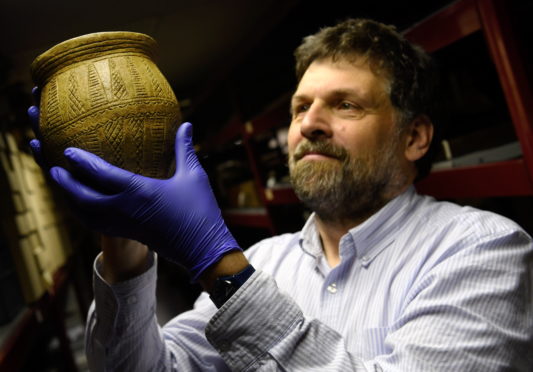A 4,000-year-old clay pot has been packed up to return to the spot it was discovered 40 years ago.
The Troup Beaker was unearthed in 1980 during an archaeological dig five miles outside of Gardenstown, at Chapelden in the Tore of Troup.
Tomorrow, it will return to the area to be the focus of a talk on the history of the village.
It is believed the pot belonged to the Beaker People who arrived in the north-east around 4,500 years ago.
They were across the UK between 2500 and 2000BC before the Celts, Gaels and Romans had moved in.
Many fragmented beakers have been found over the years , mostly behind the backs of the buried dead from their communities.
Pots found have helped archaeologists to piece together the history of the beaker people and the Troup Beaker, which is kept as part of the museum collections at Aberdeen University, gives an insight into that life.
Bringing the historic artefact back to Gardenstown and presenting a talk about its history will be Neil Curtis, head of museums and special collections at the university.
Along with the Troup Beaker will be a selection of other prehistoric items from the museum collection that will tie into the bigger story known about the pot.
Mr Curtis said: “We’ve about 50 beakers from the north-east in our collection – in Scotland there are some but they were most commonly found in the north-east.
“The Troup Beaker is complete as it was found in the stone cist setting with the decaying body of a man and it stayed there protected by the stone slabs for four thousand years.
“What’s really unusual is that the man buried with the pot had stone slabs above which were covered in shards of another one – that’s not really been seen before.
“For the talk I will set the beaker in the right context in the north-east and Europe about what was going on 4,000 years ago then tie in the similarities with other beakers.”
Mr Curtis went to work for the museum and learned about the collection, and is now keen to get more people researching their local area.
Mr Curtis added: “These beakers are a European phenomenon and significant to the whole continent as well as the local north-east so we’re trying to get people more interested in the past.
“So far we believe the beakers were mostly for burial purposes but some have been found with dribbles showing they used to hold alcohol – it’s really interesting.”
The presentation will take place at the Gardenstown Community Hub tomorrow. Doors open at 7pm, with the talk beginning at 7.30pm.
